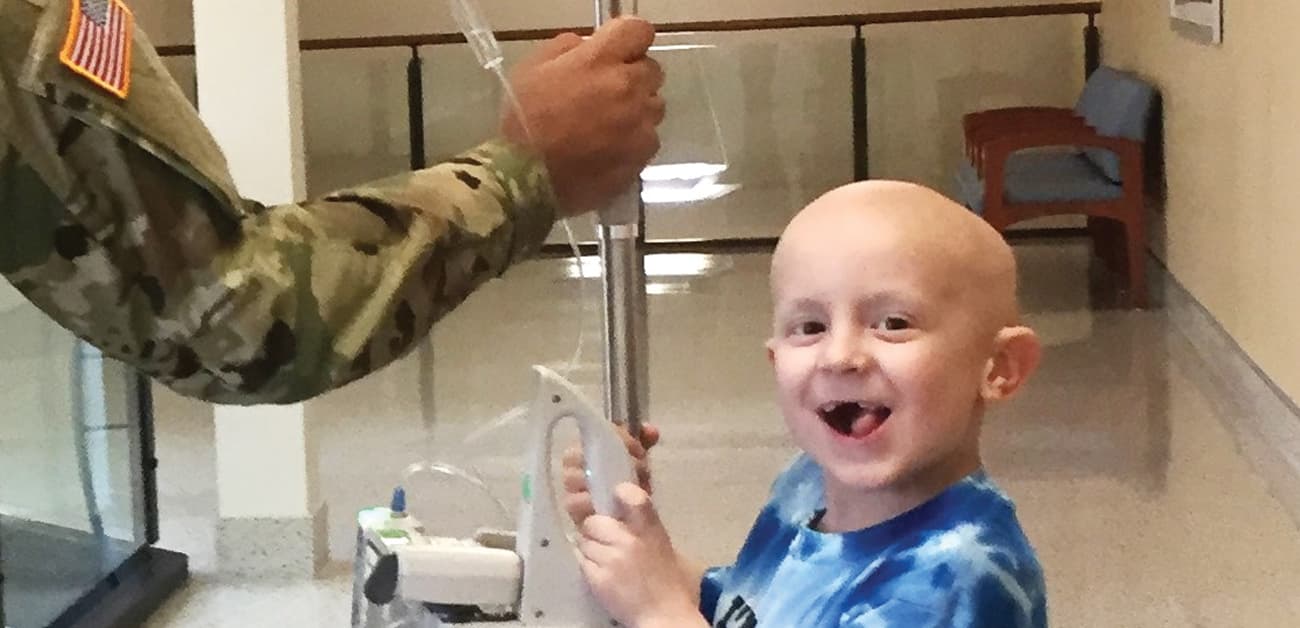
- Six years ago, Linda Wolf started a toy drive for children admitted to Walter Reed National Medical Center.
- She launched a program in 2018 that enabled children to watch movies while they were receiving MRI scans, reducing their fears and boredom.
- With the addition of another system at a Honolulu military hospital earlier this year, nearly 5,000 patients at the two centers annually will find their MRIs more tolerable.
Tom Lewis was just 6 years old when he was diagnosed with a malignant brain tumor. A trouper like his active-duty military mom, he bravely endured surgery, chemotherapy, radiation, and blood draws at Walter Reed National Military Medical Center in Bethesda, Md. But he hated the frequent MRIs, which required him to lie perfectly still and alone in a clanging, narrow tube for up to two hours.
Before each scan, Tom grew more and more anxious. Sometimes the procedure had to be stopped and rescheduled due to his distress. His worried parents resisted subjecting him to sedation and its potential complications and side effects. “As parents, there is no greater pain than seeing your child suffer,” says Amber Lewis, Tom’s mother.
Today, Walter Reed’s youngest warriors have a far more pleasant MRI experience, thanks to Linda Trinkle Wolf, a sales associate at KW Metro Center in Alexandria, Va. She formed a nonprofit, Mission: M4, to raise money for high-tech video display systems that allow patients to watch movies while undergoing their scans. Mission: M4 stands for Military MRI Minus Medication. ”These are little kids, and they deserve everything we can give them,” Wolf says. “It’s not that they don’t get the expert medical care they need, they do, but they don’t get all the extras they would get in a private hospital.”
It All Started with Toys
Before she obtained her real estate license in 1997 and began working with military clients, Wolf’s only military connection was an uncle who died at Iwo Jima during World War II before she was born. But on the job, she came to understand their commitment to duty and the sacrifices these families make, often moving from place to place and separating from loved ones for long periods of time. Having a critically ill child like Tom compounds the strain. “People don’t realize it’s not just the military—it’s the whole family that serves,” Wolf says.
“What I do is so minor compared to what they do. These families put their lives on the line for us.” —Linda Trinkle Wolf
Six years ago, Wolf decided to replace worn-out toys in the children’s playroom at Walter Reed, which serves active-duty military personnel and their dependents. She hosted an ice cream social for friends and clients and asked them to contribute. She also arranged for toy-filled carts to be brought to patients quarantined or too frail to leave their rooms.
Soon Wolf was thinking bigger. She solicited donations from toymaker Hasbro, who now sends pallets of toys as they are needed. Each shipment is valued between $3,000 and $6,000. Wolf then sought out additional projects to improve hospital life for kids at Walter Reed. She secured Xbox video game consoles for pediatric patient rooms and the chemotherapy infusion center, so children could fill long and sometimes painful hours playing their favorite games. She also raised funds to provide personal DVD players for patient use in the sedation unit.
Building Relationships

Bringing in the video display systems, which cost $50,000 each, has been a more complicated endeavor. Not only are the monetary stakes higher than her previous projects, but navigating the lengthy government approval process is challenging. To buttress her credibility, Wolf in 2017 founded her nonprofit and enlisted seven U.S. Republican and Democrat senators to serve as honorary chairpersons. Among them was John McCain, who died in 2018. She also partnered with the Walter Reed Society and Foundation, sister organizations that provide tangential assistance like transportation and lodging that the government does not cover.
The first MRI video display system, donated by the manufacturer, was installed at Walter Reed in October 2018. The second, at Tripler Army Medical Center in Honolulu, was paid for through Wolf’s fundraising efforts and began operating in February. Between the two hospitals, about 4,900 patients a year will find their MRIs more tolerable. Her goal is for every military hospital to have one of the systems, and they’ll likely serve adults with claustrophobia as well as kids.
“Linda is an outstanding example of one person truly making a difference,” says John R. Pierce, M.D., president of the Walter Reed Society and a retired colonel with the U.S. Army Medical Corps. “She has been the driver for this whole thing. We’ve been able to open a few doors, but her initiative and her energy made this happen.”
Wolf is once again thinking bigger by advocating for federal funding for more video display systems. In the meantime, at Walter Reed, she is raising funds for a parents’ lounge equipped with computers, a shower, and a large-screen TV as well as art and theater programs for the children. “What I do is so minor compared to what [these families] do,” says Wolf, who has so far raised about $200,00 in goods and cash. “They put their lives on the line for us. They are out there in the world keeping me and my grandchildren safe.”
MRI Makeover
One beneficiary of the new video display system is Tom Lewis. The first time he used it, instead of coming home upset and complaining about the long, boring MRI, he was ecstatic. His first comment to his mother was, “I got to watch a movie!” He had seen the animated comedy “Cars.”
Tom, now 10, appears to have recovered from his brain cancer. While he will require regular MRIs the rest of his life to ensure early detection in case it returns, he is not as fearful of them as he once was. The doctors and nurses at Walter Reed saved her son’s life, Amber Lewis says, but Wolf helped him in a way no one else could. “Cancer sucks, especially when it’s your own child going through it,” Lewis says. “Knowing there are good people like Linda, who want to help children win the fight, made the fight a little easier for this mom.”
Contact Linda Trinkle Wolf at linda@lindawolfhomes.com and learn more about Mission M4.










